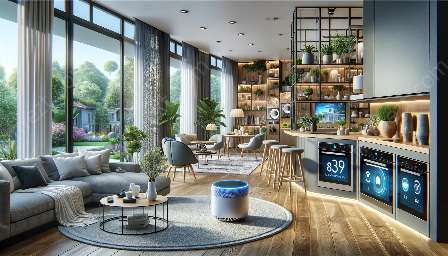Modern technology has revolutionized the way we interact with our living spaces. The emergence of voice-controlled home systems marks a significant step towards intelligent and intuitive home design. At the center of this technological evolution are mobile devices, which serve as the gateway to seamlessly integrate voice control into our homes. This article explores the pivotal role of mobile devices in voice-controlled home systems and their compatibility with voice-controlled home appliances and intelligent home design.
Voice-Controlled Home Systems and Mobile Devices
Voice-controlled home systems have gained popularity due to the convenience and futuristic appeal they offer. These systems leverage the capabilities of artificial intelligence and IoT (Internet of Things) to enable users to control various aspects of their homes using voice commands. Mobile devices, such as smartphones and tablets, play a crucial role in enabling the seamless integration of these voice-controlled systems. Through dedicated apps and built-in features, mobile devices act as the primary interface for users to interact with and issue commands to their voice-controlled home systems.
By harnessing the processing power and connectivity of mobile devices, voice-controlled home systems can interpret and execute voice commands with accuracy and efficiency. This synergy between mobile devices and voice-controlled systems empowers users to effortlessly manage household tasks, access information, and even monitor and interact with intelligent home appliances.
Compatibility with Voice-Controlled Home Appliances
An essential aspect of the role of mobile devices in voice-controlled home systems is their compatibility with voice-controlled home appliances. As the adoption of smart appliances continues to grow, the need for seamless integration with voice-controlled systems becomes increasingly important. Mobile devices act as the bridge that connects users, voice-controlled systems, and intelligent home appliances.
Through mobile apps and connectivity protocols such as Wi-Fi and Bluetooth, users can control and monitor a wide range of voice-controlled home appliances using their mobile devices. Whether it's adjusting the temperature, managing energy consumption, or scheduling appliance operations, mobile devices empower users with the convenience of voice-based control over their home appliances. This level of compatibility fosters an ecosystem where mobile devices serve as the central command hub for orchestrating a harmonious interaction between users and their voice-controlled home appliances.
Intelligent Home Design and Mobile Integration
The concept of intelligent home design encompasses the seamless integration of advanced technologies to enhance comfort, convenience, and energy efficiency within residential spaces. Mobile devices, with their inherent versatility and connectivity, play a pivotal role in realizing the vision of intelligent home design. Through the integration of voice-controlled systems, mobile devices contribute to the creation of homes that are not only smart but also responsive and adaptive to the needs and preferences of the occupants.
Intelligent home design leverages the capabilities of mobile devices to establish a unified platform for managing various aspects of home automation, security, and entertainment. Whether it's adjusting lighting conditions, managing security cameras, or controlling multimedia systems, mobile devices serve as the primary interface for users to interact with and orchestrate the intelligent features of their homes through intuitive voice commands.
Conclusion
The role of mobile devices in voice-controlled home systems transcends mere technological integration; it represents a shift towards a more intuitive and responsive living environment. By enabling seamless interaction with voice-controlled systems and fostering compatibility with intelligent home appliances, mobile devices empower users to embrace the potential of intelligent home design. As technology continues to evolve, the synergy between mobile devices, voice-controlled home systems, and intelligent home design will undoubtedly redefine the way we experience and interact with our living spaces.


